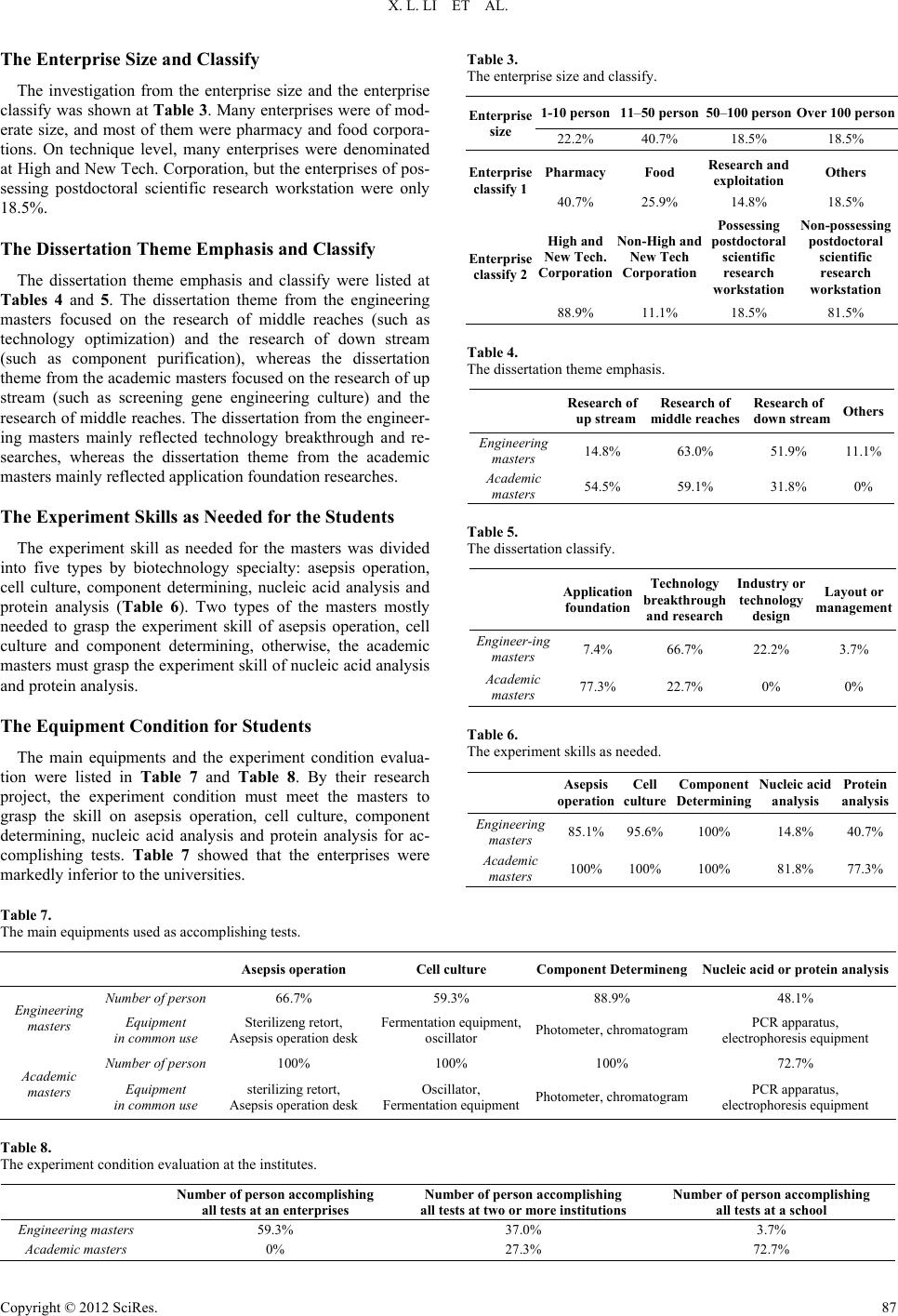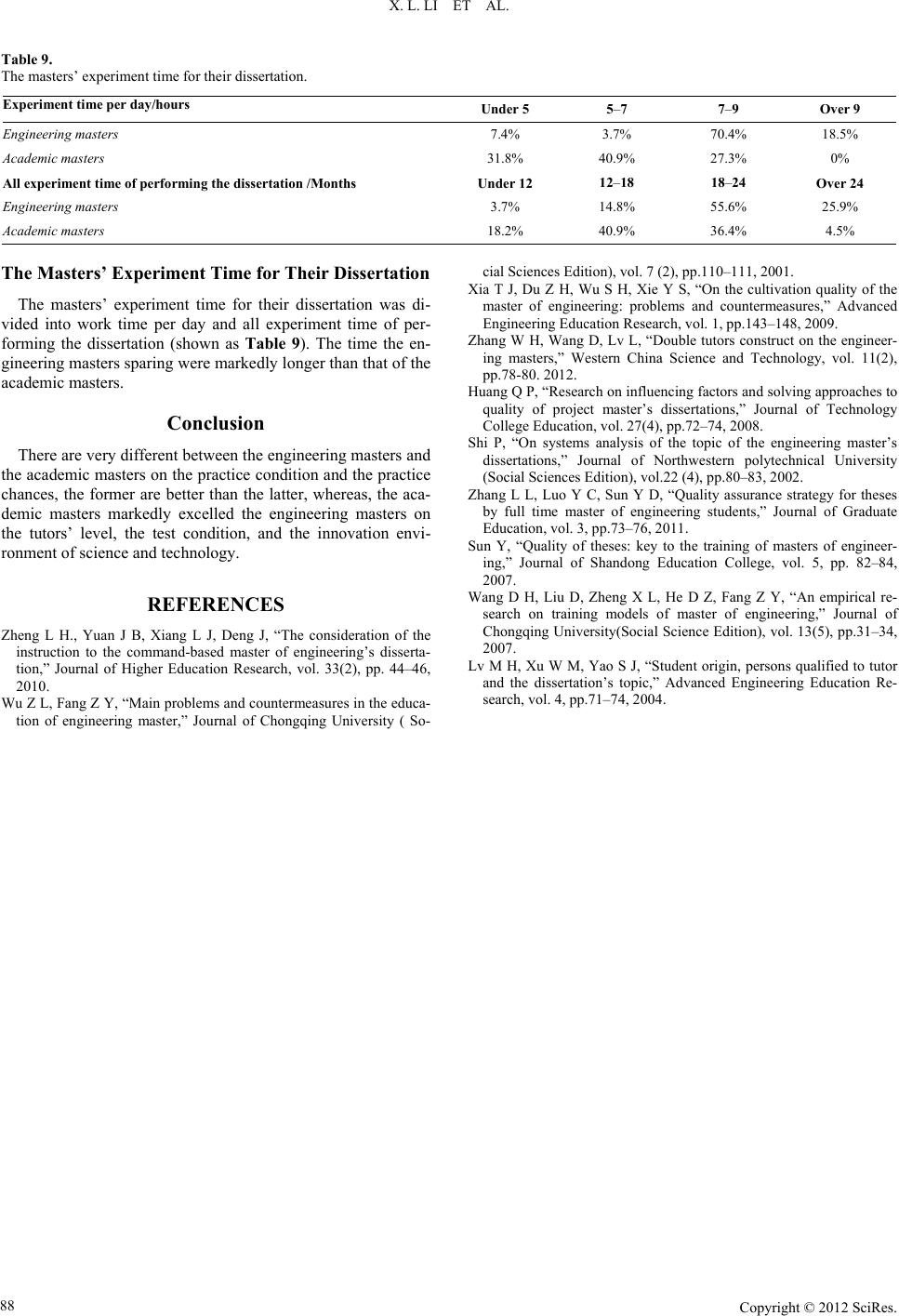Paper Menu >>
Journal Menu >>
 Creative Education 2012. Vol.3, Supplement, 86-88 Published Online December 2012 in SciRes (http://www.SciRP.org/journal/ce) DOI:10.4236/ce.2012.37B022 Copyright © 2012 SciRes. 86 Quality Analysis on the Engineering Master of Biotechnology Specialty from Enterprise Xinglin Li, Yang Han, Aijie Cao, Jun Zhao, Liming Zhang, Shuli Man, Wenyuan Gao Key Laboratory of Industrial Microbiology, Ministry of Education, Tianjin University of Science and Technology, Tianjin, China Email: lxlszf@tust.edu.cn Received 2012 In order to express the engineering master’s culture status of biotechnology from some enterprises, by questionnaire, 27 engineering masters from some enterprises and 22 academic masters from two universi- ties, were investigated on the graduate students’ origin, their tut ors’ title, the enterprise size and classify, their dissertation theme emphasis and classify, and the experiment condition for their dissertations. The results indicated that, the engineering masters were better than the academic masters on the practice con- dition and the practice chances, whereas, the academic masters markedly excelled the engineering masters on the tutors’ level, the test condition, and the innovation environment of science and technology. Keywords: Engineering Master; Enterprise Culture; Biotechnology Specialty; Comparison Introduction Since 1984, the engineering master culture has performed for over 20 years,many engineering masters are cultured into the practical talents of engineering[1-3]. The engineering masters’ culture is a type of all graduate students’ education as the aca- demic masters, but the former emphasize particularly on cul- turing the practical and composite talents for some enterprises [1, 4-6], therefore, comparison with the academic masters, it is very different at the students’ types, culturing approach, and knowledge frame [7, 8]. But there are many questions during culturing of the engineering masters, they mainly are shown that, its’ culturing approach lacks diversity, the culture object isn’t clear, moreover, the teaching teams of the tutors from some enterprises need to be enhanced, and so on [6, 8-10]. Biotechnology, an engineering master specialty, is bringing into very important role at food, medicine, and so on. But its’ engineering master culture status from the enterprises was scarcely reported. So this pape r arm is to try to research the fact by questionnair e. Investigation Methods By questionnaire, 27 engineering masters from some enter- prises and 22 academic masters from Tianjin University of Science and Technology and Tianjin University of Commerce , were investigated on the graduate students’ origin, their tutors’ title, the enterprise size and classify, their dis ser tation theme emphasis and classify, and the experiment condition for the ir dissertations. The engineering masters study on the biotech- nology specialty at the enterprises, while the academic masters mainly study on ferment engineering specialty. Results and Discussion The Graduate Students’ Origin and Their Tutors’ Title There were difference between the engineering masters and the academic masters at the graduate students’ origin (Table 1). The in-service staffs and the equal educational background students of the engineer masters were more than those of the academic masters. The educational background and the positional title of the research supervisors were listed in Table 2. The research su- pervisors from the schools excelled the research supervisors from the enterprises on the educational background and the positional title, so the latter should be improved. Table 1. The graduate students’ origin. Fresh graduates Former year's graduates Equal educat ional background students In-service staffs Engineering masters 59.3% 18.5% 22.2% 18.2% Non-engineering masters 77.3% 22.7% 0% 0% Table 2. The educational background and the positional title of the research supervisors. Educational background College dipl oma University diploma Postgraduate dipl oma Research supervisors from the enterprise 18.5% 66.7% 14.8% Research supervisors from the university 0% 9.1% 90.1% Positional title Junior Intermediate Senior Research supervisors from the enterprise 11.1% 29.6% 59.3% Research supervisors from the university 0% 0% 100%  X. L. LI ET AL. Copyright © 2012 SciRes. 87 The Enterprise Size and Classify The investigation from the enterprise size and the enterprise classify wa s shown at Table 3. Many enterprises were of mod- erate size, and most of them were pharmacy and food corpora- tions. On technique level, many enterprises were denominated at High and New Tech. Corporation, but the enterprises of pos- sessing postdoctoral scientific research workstation were only 18.5%. The Dissertation Theme Emphasis and Classify The dissertation theme emphasis and classify were listed at Tables 4 and 5. The dissertation theme from the engineering masters focused on the research of middle reaches (such as technology optimization) and the research of down stream (such as component purification), whereas the dissertation theme from the academic masters focused on the research of up stream (such as screening gene engineering culture) and the research of middle reaches. The dissertation from the engineer- ing masters mainly reflected technology breakthrough and re- searches, whereas the dissertation theme from the academic masters mainly reflected application foundation researches. The Experiment Skills as Needed for the Students The experiment skill as needed for the masters was divided into five types by biotechnology specialty: asepsis operation, cell culture, component determining, nucleic acid analysis and protein analysis (Table 6). Two types of the masters mostly needed to grasp the experiment skill of asepsis operation, cell culture and component determining, otherwise, the academic masters must grasp the experiment skill of nucleic acid analysis and protein analysis. The Equipment Condition for Students The main equipments and the experiment condition evalua- tion were listed in Table 7 and Table 8. By their research project, the experiment condition must meet the masters to grasp the skill on asepsis operation, cell culture, component determining, nucleic acid analysis and protein analysis for ac- complishing tests. Table 7 showed that the enterprises were markedly inferior to the universitie s . Table 3. The enterprise size and classify. Enterprise size 1-10 person 11–50 person 50–100 person Over 100 person 22.2% 40.7% 18.5% 18.5% Enterprise classify 1 Pharmacy Food Research and exploitation Others 40.7% 25.9% 14.8% 18.5% Enterprise classify 2 High and New Tech. Corporation Non- High and New Tech Corporation Possessing postdoctoral scientific research workstation Non-possessing postdoctoral scientific research workstation 88.9% 11.1% 18.5% 81.5% Table 4. The dissertation theme emphasis. Research of up stream Research of middle reaches Research of down stream Others Engineering masters 14.8% 63.0% 51.9% 11.1% Academic masters 54.5% 59.1% 31.8% 0% Table 5. The dissertation classify. Application foundation Technology breakthrough and research Industry or technology design Layout or management Engineer-ing masters 7.4% 66.7% 22.2% 3.7% Academic masters 77.3% 22.7% 0% 0% Table 6. The experiment skills as needed. Asepsis operation Cell culture Component Determining Nucleic acid analysis Protein analysis Engineering masters 85.1% 95.6% 100% 14.8% 40.7% Academic masters 100% 100% 100% 81.8% 77.3% Table 7. The main equipments used as accomplishing tests. Asepsis operation Cell culture Component Determineng Nucleic acid or protein analysis Engineering masters Number of person 66.7% 59.3% 88.9% 48.1% Equipment in common use Sterilizeng retort, Asepsis operation desk Fermentation equipment, oscillator Photometer, chromatogram PCR apparatus, electrophoresis equipment Academic masters Number of person 100% 100% 100% 72.7% Equipment in common use sterilizing retort, Asepsis operation desk Oscillator, Fermentation equipment Photometer, chromatogram PCR apparatus, electrophoresis equipment Table 8. The experiment condition evaluation at the institutes. Number of pe r son acc omplishing all tests at an enterprises Number of person accomplishing all tests at two or more i nst i tutions Number of person accomplishing all tests at a scho ol Engineering masters 59.3% 37.0% 3.7% Academic masters 0% 27.3% 72.7%  X. L. LI ET AL. Copyright © 2012 SciRes. 88 Table 9. The masters’ experiment time for their dissertation. Experiment time per day/hours Under 5 5–7 7–9 Over 9 Engineering master s 7.4% 3.7% 70.4% 18.5% Academic masters 31.8% 40.9% 27.3% 0% All experiment time of performing the dissertation /Months Under 12 12–18 18–24 Over 24 Engineering master s 3.7% 14.8% 55.6% 25.9% Academic masters 18.2% 40.9% 36.4% 4.5% The Masters’ Experiment Time for Their Dissertatio n The masters’ experiment time for their dissertation was di- vided into work time per day and all experiment time of per- forming the dissertation (shown as Table 9). The time the en- gineering masters sparing were markedly longer than that of the academic masters. Conclusion There are very different between the engineering masters and the academic masters on the practice condition and the practice chances, the former are better than the latter, whereas, the aca- demic masters markedly excelled the engineering masters on the tutors’ level, the test condition, and the innovation envi- ronment of science and technology. REFERENCES Zheng L H., Yuan J B, Xiang L J, Deng J, “The consideration of the instruction to the command-based master of engineering’s disserta- tion,” Journal of Higher Education Research, vol. 33(2), pp. 44–46, 2010. Wu Z L, Fang Z Y, “Main problems and countermeasures in the educa- tion of engineering master,” Journal of Chongqing University ( So- cial Sciences Edition), vol. 7 (2), pp.110–111, 2001. Xia T J, Du Z H, Wu S H, Xie Y S, “On the cultivation quality of the master of engineering: problems and countermeasures,” Advanced Engineering Education Resea rch, vol. 1, pp.143–148, 2009. Zhang W H, Wang D, Lv L, “Double tutors construct on the engineer- ing masters,” Western China Science and Technology, vol. 11(2), pp.78-80. 2012. Huang Q P, “Research on in fluencing f actors and s olving appro aches to quality of project master’s dissertations,” Journal of Technology College Educa tion, vol. 27(4) , pp.72–74, 2008. Shi P, “On systems analysis of the topic of the engineering master’s dissertations,” Journal of Northwestern polytechnical University (Social Sciences Edition), vol.22 (4), pp.80–83, 2002. Zhang L L, Luo Y C, Sun Y D, “Quality assurance strategy for theses by full time master of engineering students,” Journal of Graduate Education, vol . 3, pp.73–76, 2011. Sun Y, “Quality of theses: key to the training of masters of engineer- ing,” Journal of Shandong Education College, vol. 5, pp. 82–84, 2007. Wang D H, Liu D, Zheng X L, He D Z, Fang Z Y, “An empirical re- search on training models of master of engineering,” Journal of Chongqing University(Social Science Edition), vol. 13(5), pp.31–34, 2007. Lv M H, Xu W M, Yao S J, “Stu dent origin, persons qualified to tutor and the dissertation’s topic,” Advanced Engineering Education Re- search, vol. 4, pp.71–74, 2004. |

